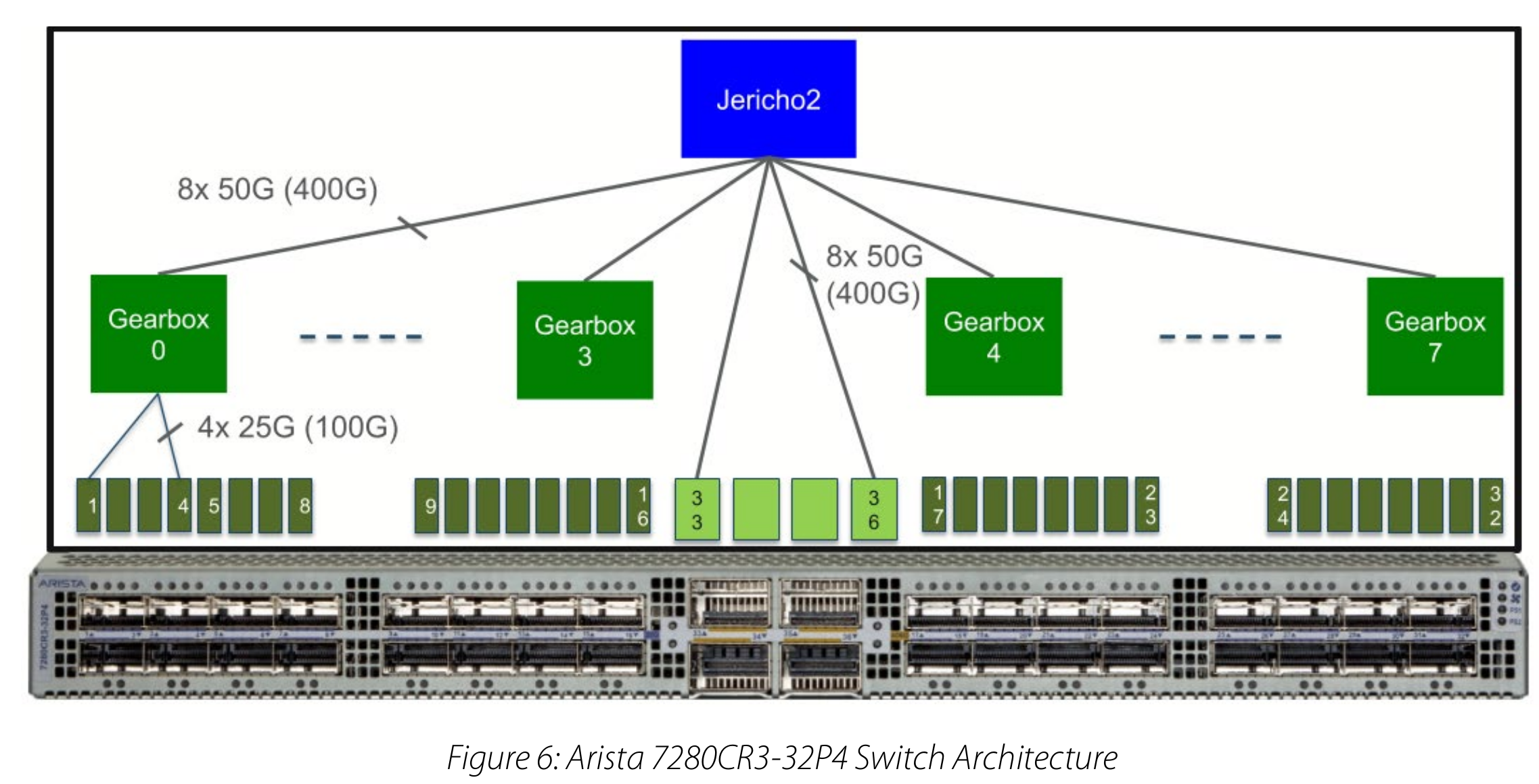Date created: Thursday, June 30, 2022 3:11:18 PM. Last modified: Thursday, March 20, 2025 10:33:05 AM
Arista Platform Overview
References
https://www.arista.com/assets/data/pdf/Whitepapers/7280R3-Platform-Architecture-WP.pdf
https://www.arista.com/assets/data/pdf/Whitepapers/Arista7500RSwitchArchitectureWP.pdf
https://people.ucsc.edu/~warner/buffer.html
https://www.arista.com/en/products/7280r3-series
https://www.arista.com/assets/data/pdf/Datasheets/7280R3-Data-Sheet.pdf
Merchant silicon used in Arista (see also Broadcom - Hardware Overview)
Arista 7050S-64 uses Broadcom Trident+.
Arista 7280E-64 uses the Broadcom Arad.
Arista 7050X uses 1x Broadcom TridentII.
Arista 7250X uses multiple Broadcom TridentIIs.
Arista 7050CX3-32S and Arista 7050SX3-48YC8 use Broadcom Trident3.
Arista 7050PX4-32S and Arista 7050DX4-32S use Broadcom Trident4.
Arista 7060CX-32, 7260QX-64, and 7260CX-64 use Broadcom Tomahawk(s).
Arista 7060CX2-32S uses Broadcom Tomahawk+.
Arista 7260QX-64 uses Broadcom TomahawkII.
Arista 7060PX4-32 and Arista 7060DX4-32 use Broadcom Tomahawk3 (12.8Tbps, 32x400GbE QSFP-DD).
Arista 7060X5 uses Broadcom Tomahawk4.
Arista 7280QR-C36 uses Broadcom Jericho.
Arista 7020SR-24C2 uses Broadcom Qumran.
Arista 7170-32CD and 7170-32C use 1x Barefoot Tofino. 7170-64C and 7170B-64C use 2x Barefoot Tofinos.
(Barefoot Tofino supports from 1.9Tbps to 6.4Tbps depending on the variant.)
Arista 7280SR2A-48YC6 uses 1x Broadcom Jericho+ and Arista 7500R2-36CQ uses 2x Broadcom Jericho+'s, with 4GBs of off-chip buffers per Jericho+ ASIC in both cases.
Arista 7280SR3 use 1x or 2x Qumran 2C depending on port count and port speed.
Arista 7280CR3 use 1x or 2x Jericho 2s (depending on port count and port speed), each with 8GBs of HBM buffers.
Arista 7280DR3 use 2x Jericho 2s each with 8GBs of HBM buffers.
Arista codename "Sand" applies to Qumran-MX, Qumran-AX, Jericho, Jericho+, and Jericho2 chips.
The iterations of the packet processing silicon in the Arista products are "Petra" (the first generation in 2010 used in 7500, 7048), "Arad" (the second generation in 2013 used in 7500E, 7280E), "Sand"/Jericho (the third generation in 2016 used in 7500R and 7280R). Jericho+ is used in the fourth generation 7500R2 (in 2017). Jericho2 is used in the fourth generation 7280R3 (in 2019).
Naming Schema
DCS means Data Center Switch product line
A means faster CPU (AMD Ryzen at the time "A" was first added)
C means 100G ports
CL means high accuracy clock (usually on older models)
D means 400G QSFP-DD ports
F means front-to-rear air flow
FLX relates to the license, this is FLX license for up to 2M routes (LIC-FIX-4-FLX )
K means expanded forwarding table (LPM) memory
R2K means expanded forwarding table memory with Jericho+
R3K means expanded forwarding table memory, with Jericho2
M means expanded memory to 32GB of RAM
P means 400G OSFP ports
R means rear-to-front air flow
SR means enhanced routing capability
R means Jericho/Qumran
R2 means Jericho+
R3 means Jericho2C or Jericho2 (depends on switch/router model)
S means SFP+ ports
T means copper connections
X means 10G ports
Y means 25G ports
DCS-7050TX-96-F uses copper connections
DCS-7050TX-96-F the connections are 10G (10GBase-T)
DCS-7050TX-96-F supports upto 96 ports (48x 10G copper, and upto another 48 if using breakouts)
DCS-7050TX-96-F has front-to-rear air flow
DCS-7280SR2K-48C6-M-F uses Jericho 2+ ??????
DCS-7280SR2K-48C6-M-F has expanded forwarding tables
DCS-7280SR2K-48C6-M-F has 48x ports (mixed 10G and 25G)
DCS-7280SR2K-48C6-M-F ports are SFP+ ports
DCS-7280SR2K-48C6-M-F has 6x 100G ports
DCS-7280SR2K-48C6-M-F has 32GBs of RAM
DCS-7280SR2K-48C6-M-F has front-to-rear air flow
DCS-7280DR3-24-M-FLX-F uses Jericho 2
DCS-7280DR3-24-M-FLX-F supports expanded forwarding tables
DCS-7280DR3-24-M-FLX-F has 64GBs of RAM
DCS-7280DR3-24-M-FLX-F has 24 ports
DCS-7280DR3-24-M-FLX-F has QSFP-DD ports
DCS-7280DR3-24-M-FLX-F has front-to-rear air flow
7280 Series Examples
Arista 7280CR3K-36S
1x Jericho2C to provide 2.4Tbps of full-duplex capacity with 16MBs of on-chip SRAM buffers and 4GBs of on-chip HBM2 buffers.
36x 100G QSFP28 ports.
The first 24 QSFP28 ports each use 4x25G lanes direct to the Jerich2C chip without gearboxes. The ports 25-36 use gearboxes and allow the ports to operate in various speeds. In total upto 4Tbps of front-panel connectivity can be configured allowing for ASIC overscubscription.
CR3K supports upto 5M IPv4/IPv6 unicast FIB entries when using FlexRoute.
Arista 7280SR3K-48YC8A
1x Jericho2C to provide 2.4Tbps of full-duplex capacity with 16MBs of on-chip SRAM buffers and 4GBs of on-chip HBM2 buffers.
48x 25G SFP28 ports and 8x 100G QSFP28 ports.
SR3K supports upto 5M IPv4/IPv6 unicast FIB entries when using FlexRoute.
Arista 7280CR3K-32P4 and 7280CR3K-32D4
1x Jericho2 to achieve 4.8Tbps of full-duplex capacity with 32MBs of on-chip SRAM buffers and 8GBs of on-chip HBM2 buffers.
32x 100G QSFP ports with 4x QSFP-DD ports or 4x OSFP ports.
"In this model, 4x 400G ports are connected directly to the Jericho2 chip, while the QSFP ports are placed after 8 gearboxes that each convert sets of 8x 50Gbps PAM4 SerDes lanes to 16x 25Gbps NRZ to support 4-lane 100GE and 40GE interfaces".
CR3K supports upto 5M IPv4/IPv6 unicast FIB entries when using FlexRoute.

Arista 7280CR3K-96
2x Jericho2äs with the fabric SerDes linked together to achieve 9.6Tbps of full-duplex capacity with 32MBs of on-chip SRAM buffers and 8GBs of on-chip HBM buffers per Jericho2.
96x QSFP ports.
CR3K supports upto 5M IPv4/IPv6 unicast FIB entries when using FlexRoute.
Arista 7280PR3K-24 and 7280DR3K-24
2x Jericho2's with the fabric SerDes linked together to achieve 9.6Tbps of capacity, with with 32MBs of on-chip SRAM buffers and 8GBs of on-chip HBM2 buffers per Jericho2.
24x400GbE OSFP ports or 24x400GbE QSFP-DD ports respectively.
Each 400G port has 8x 50G PAM4 SerDes lanes direct to one of the two Jericho's, no gearboxes are present in this device.
PR3K/DR3K supports upto 5M IPv4/IPv6 unicast FIB entries when using FlexRoute.
Previous page: Local Route Leaking Agent
Next page: cEOS Overview